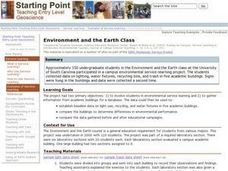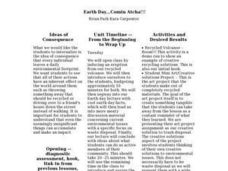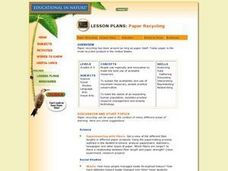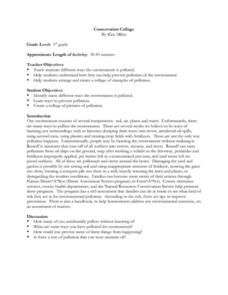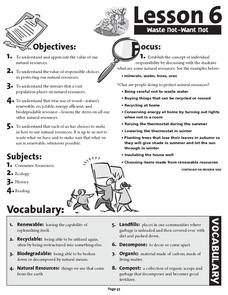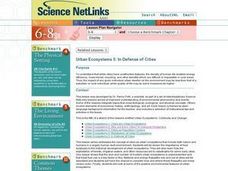Curated OER
Second Time Around
Young scholars explore how items can be reused. In this recycling lesson, students present skits about reusing materials and brainstorm products that can be reused at home, school and in the classroom.
Curated OER
Environment and the Earth
Students were involved in environmental service learning and they gathered information from academic buildings for a database. The data allowed them to use an establish baseline data on light use, recycling, and water fixtures in five...
Curated OER
Don't Use it All Up
Students observe the way that a sponge absorbs liquids and discuss how we our use of natural resources affects the environment around us. They discuss the need to conserve resources so we don't run out of what we need.
Curated OER
Are You Balanced With Your Environment?
Students discuss the impact of not keeping the environment in balance for future generations. As a class, they are introduced to the concept of "Balance of Nature" and what it means. In groups, they research the role of trees and how to...
Curated OER
Fan 3: Sort and Color!
Young scholars explore the concept of recycling. In this environmental stewardship lesson, students discover how to recycle and compost. Young scholars complete an activity that requires them to sort recyclable items.
Curated OER
Career and Personal Planning
Pupils visit Conservation in Action web site to watch three video interviews with Vancouver Aquarium researchers, complete Careers in Conservation worksheet, research threats facing species featured on Conservation web site, and create...
Curated OER
Waste Management
Students explore the impact on waste on the environment, and the impact of the 3R's (reduce, reuse and recycle) as a means of diminishing the waste created by humans.
Curated OER
Resources
In this resources worksheet, students review how reducing, reusing, and recycling help to conserve resources. Students compare renewable resources with non-renewable resource. This worksheet has 27 short answer questions.
Curated OER
Truth or Consequences
In this energy conservation activity, students answer questions about energy sources and energy use. The activity includes both true/false and multiple choice questions. There are 22 questions with answers.
Curated OER
Earth Day...Comin Atcha!!!
Students explore the idea of consequence that every individual leaves a daily environmental footprint. They read articles about creative solutions to solid waste issues and then create an artwork from household trash.
Curated OER
Natural Resources: Can We Use Them Forever? Grade 2
Bright colors and animation are great ways to attract a young students attention. Students are introduced to the concepts of renewable and non-renewable resources as they pose the question, will our resources be around forever? This...
Curated OER
Light Saver
Turn off the lights! That's right it's time to start thinking about conservation and saving electricity. Here is a very quick and very simple Earth Day craft that kids can do in a wink. They'll make light-bulb-shaped door hangers that...
Curated OER
Marine Debris
Now is the time to educate tomorrow's citizens to care for the planet, and here is a instructional activity to help facilitate the process. Collect some marine debris and bring it into class. Have your class separate it into types and...
Curated OER
How Can We Conserve Water?
Students describe the importance of water conservation and list ways to conserve. They construct composts and fill them with materials that recycle nutrients. They inspect their homes for leaky pipes, toilets, and faucets.
Curated OER
Energy Efficiency: It really IS important!
Students compare the energy needed to produce new products versus recycling. In this physics lesson, students brainstorm ways to save energy. They create a presentation about the correlation between conserving energy and energy costs.
Curated OER
How Can People Save Resources?
In this resources worksheet, students will review how people can save resources by reducing, reusing, and recycling. Students will fill in the blank of 4 statements in this graphic organizer.
Curated OER
Conservation and Wildlife Protection
In this conservation activity, students review renewable energy sources, farming methods that prevent erosion, and the benefits of reforestation. This activity has 8 short answer questions.
Curated OER
PAPER RECYCLING
Young scholars examine the availability and use of important resources, people practice conservation. They explore the needs of an expanding human population, societies practice resource management and employ technology.
Curated OER
Conservation Collage
Students identify many different ways the environment is polluted, and determine ways to prevent pollution. They create a collage of pictures describing how the earth becomes polluted.
California Academy of Science
Sustainable Water Solutions: Weighing the Pros and Cons
Switching indoor water fixtures to low flow reduces water usage by more than 45 percent. This and other solutions to reduce water usage have both pros and cons. Scholars view videos of different solutions, discuss them in small groups,...
Curated OER
E-Cycling!
Eighth graders research how and why electronics are recycled. In this earth science lesson, 8th graders determine the types of materials electronic devices are made up of. They produce a creative ad to encourage people to recycle.
Curated OER
Earth Day Lesson
Students analyze Earth science by answering environmental study questions. For this Earth Day lesson, students read the book The Lorax and identify the themes within it. Students define several recycling vocabulary terms and create an...
Forest Foundation
Waste Not - Want Not
Recycling is the focus in the sixth of a nine-lesson series devoted to forest ecosystems. Class members read an article about the responsible use of natural resources and ways to reduce land fill.
Curated OER
Urban Ecosystems 5: In Defense Of Cities
Young scholars explain that while cities have unattractive features, the density of human life enables energy efficiency, mass transit, recycling, and other benefits which are difficult or impossible in rural areas. This is the fifth in...



